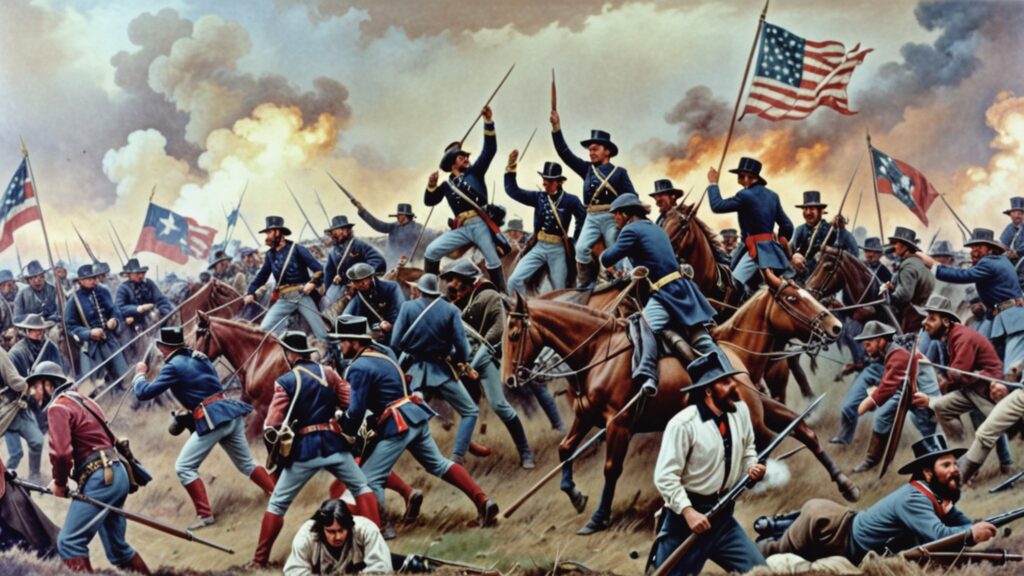Why nation of liberty doesn’t make sense anymore

Although, until recently, there was no topic that propaganda and myth connected to such a degree as the American Civil War and the question of slavery, few people know that the American Civil War did not break out primarily because of the liberation of black slaves. This civil war was different from the others, because in terms of its nature it was much more similar to the war of independence eighty years earlier.
Nevertheless just as no one would have thought of calling the secession from the British Empire a civil war, even though Great Britain never declared the right of its colonies to secede, so posterity considers the intention of the Confederation to secede from the Union to be a civil war. Let’s not forget that the right to secede from the USA still existed in theory until the 1860s. However, this is only proof that history is written by the victors.
The two wars of independence – because I think we can rightly call the American Civil War so – had the same motive. The North American British colonies objected to the fact that they were not represented in the English Parliament, yet King George imposed a tariff on tea, which they already considered high so much that they founded a new country, to which they soon paid much more taxes than the ridiculously symbolic and low tea tariff, which King George demanded. Eighty years later, the American Civil War was also caused by the introduction of a new tariff on agricultural products, which the North imposed unilaterally and adversely affected the South, which was mainly agrarian.
Although there were initiatives to free slaves, such as the Abolitionist movement, the abolition of slavery would not have arisen at the federal level if the Civil War wouldn’t have broken out. Which raises an interesting question. How would the future of slavery as an institution have developed if there had been no civil war, or the Confederacy would have succeeded in seceding either through war or peace? In the absence of empirical evidence, answering this is not the task of historians, but of philosophy.
I have to say that slavery would most likely have ended even without the total defeat of the Confederacy. Studying history, we can hardly come to any other conclusion. If not immediately, but within a few decades, slavery would certainly have been abolished, because the South would have been at an irreparable competitive disadvantage with the industrialized North, and much more efficient and cheaper mechanization would have forced the South to change. In Brazil, too, a civil war was not necessary for slavery to become unsustainable and to be replaced by free Italian wage workers. And if we look at the living conditions of the Confederate slaves, it can generally be said that they were bad, but compared to the standard of living in already liberated Haiti, it can only be said to be good.
In addition, the life prospects of the mostly black slaves did not improve after liberation, they even worsened in many ways. Not all slaves worked in the cotton fields and plantations, many of them ran households and were considered family members. However, after the liberation, many people lost their livelihood, became penniless, starved, no one wanted to employ them, and they did not receive full civil rights with the liberation until the 1960s. In fact, liberation was a disaster for most of the slaves because of this.
England had already outlawed the trans-Atlantic slave trade, and the British navy hunted down the slave cargo ships. This and the loss of the Confederacy’s market was actually a disaster for the African slaves, for their enslavement did not end there. The slave trade route ran by Arabs was diverted to the much more brutal trans-Saharan route, where slaves had zero chance of survival. In fact, the only hope for African slaves to survive was to get to Noth-America.
The result of civil war
We know what happened after the victory of the Union. The USA was no longer a community of independent states, from which any member state could unilaterally withdraw, but started on the path of becoming a global empire. The civil war set the precedent that any decision can be made at the federal level without the unilateral agreement of the member states. America’s first step in becoming an empire was the Spanish-American War, where the USA gained bases in Cuba on the Pacific Ocean and also acquired the Philippines and Puerto Cico. And after the First World War, the export of American republicanism and democracy embarked on its path of global conquest, now on an ideological basis. The era of Pax Americana has arrived.
Free trade based on the gold standard was already abolished then, and what the founding fathers had warned against was created; the rule of the central banks and the series of ideological wars financed by them, the end of which is still in sight. With this, people’s self-determination was completely eliminated. It can truly be said that for republicanism and democracy, as a whole-world concept, the territorial expansion is just essential as for the monotheistic religions the mass conversion. However, on a massive scale, this is no longer about freedom, but about ideology, that is, the loss of freedom as the end result.
Since 1918, with the spread of this secular religion, the global position of the USA has strengthened. If we look at the forms of government, democratic republicanism gave way to communism (and with it, publicly owned slavery and a series of state-financed mass murders became characteristic even in peacetime), fascism, national socialism, and finally the most durable, social democracy (liberalism). None of these are about freedom, but they all act in the name of it.
Compulsory military service became almost universal, as did restrictions on territorial movement. The frequency and cruelty of domestic and foreign wars increase in direct proportion to centralization. In terms of internal affairs, taxes are constantly increasing, the national debt is gigantic. The state is imperceptibly robbing its citizens with inflation, and the proportion of state employees and people financially dependent on the state within society is constantly increasing.
Democratic republicanism has led to the permanent abandonment of the gold standard, the unprecedented devaluation of paper money, protectionism, total restrictions on the global movement of people, and ideologically based legislation and practice.
In terms of foreign affairs, the US mainland has rarely been attacked (Pear Harbor was provoked by America), yet the US is famous for waging war against a large part of its own population and easily murdering hundreds of thousands of its own citizens. Furthermore, the relationship between American citizens and foreigners does not seem unusually controversial, the country’s government has been constantly expanding almost since its inception.
It has been involved in hundreds of foreign conflicts since the Second World War and maintains around eight hundred overseas bases, thus becoming the world’s leading imperialist power, taking the place of the British Empire. Almost every American president since the turn of the century has been responsible for killing and starving countless foreigners. For the sake of ‘national security’, he defends the world with an ever-increasing arsenal of offensive and mass destruction weapons. This is how the President of the USA has become the world’s most threatening armed menace, capable of destroying anyone who opposes him, or even destroying the entire earth.
Since World War II, the United States has intervened militarily in China (1945-46), Korea (1950-53), China (1950-53), Iran (1953), Guatemala (1954), Indonesia (1958), Cuba (1959-60 ), Guatemala (1960), Congo (1964), Peru (1965), Laos (1964-73), Vietnam (1961-73), Cambodia (1969-70), Guatemala (1967-69), Grenada (1983), Lebanon (1983), Libya (1986), El Salvador (1980s), Nicaragua (1980s), Panama (1989), Iraq (1990-99), Somalia (1993), Afghanistan (1998), Yugoslavia (1999), Iraq (2003-11), Libya (2011), Afghanistan (2001-21), and Ukraine (from 2022). Unfortunately, even now it is not possible to conclude where this will go.
Conclusion
The American Civil War really brought about the end of privately owned slavery, but it paved the way for publicly owned mass slavery, which, if we look at the killing of a quarter of a billion innocents in peacetime, on a global level, it can be said for ideological reasons that it is incomparably more brutal. Taking into account the above, the end result was not the liberation of the slaves, but the enslavement of almost all inhabitants of the planet. In this way the defeat of the Confederacy created equality of opportunity in slavery.
Thanks for reading!

